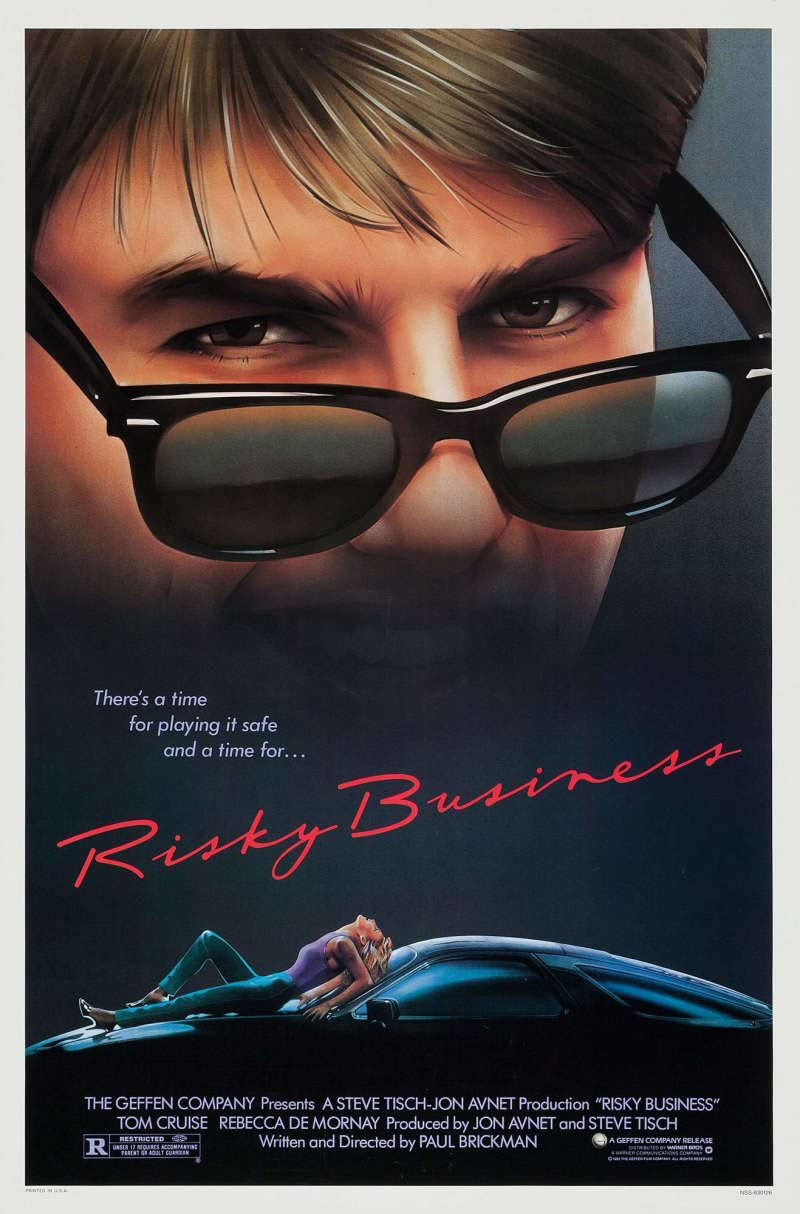When I was a child, my parents made a poor decision. They wanted to go see a movie, but they couldn’t find a babysitter. I don’t recall if a sitter canceled, or they decided to go out on short notice, or if I was such a young terror that I’d burned through all the numbers in the address book. Either way, my folks were determined to go see a movie, and if no sitter could be found, then I was going to see a movie, too. If that movie was an R-rated feature about a lustful teenager and a smoking hot call girl, then so be it. Besides, as my parents reasoned, the boy is only six years old. Not only will he forget what he sees, he won’t understand any of it, anyway.
Truth be told, there’s only about fifteen seconds of nudity in Risky Business. But as far as I can remember, this flick had the first tits I’d ever seen in a movie. For the Love of Benji, which was on heavy rotation in my house at the time, certainly didn’t have any.
My parents were right about one thing. I could not follow the plot. It’s not a complicated story at all, for an adult. But for a little kid, there were too many words. Even if I were capable of keeping track, it would not have mattered. Because this movie wasn’t even a half-hour old and the image of a nude Rebecca De Mornay was tattooed on my brain. Being so young, no one had yet told me about sex, so it’s understandable that my parents had thought a little naked skin would be as incomprehensible as the plot, but they were wrong.
It was like a primal switch had been flipped. Those few seconds of Ms. De Mornay — young, lithe — activated old genetics, from back before humans felt the need to explain everything to each other. All species other than human never need any schooling about physical attraction.  And neither do we, as it turns out. It must have been days before I managed to get her image out of my head. So, to my parents, I thank you. Your stressed-out, awfuckit parenting moment resulted in my first real boner.
And neither do we, as it turns out. It must have been days before I managed to get her image out of my head. So, to my parents, I thank you. Your stressed-out, awfuckit parenting moment resulted in my first real boner.
There couldn’t have been a better pick to star in Risky Business, the 1983 film from writer/director Paul Brickman, than Tom Cruise. Cruise was ready to bust out and become a star. If it wasn’t Risky Business, it would have been something else. He would have carried and owned some other film that would be anonymous with any number of his peers in the lead role instead of him, and it would be that film that would be remembered as the true launching point of a big time Hollywood career. As it is, it’s Risky Business that was the breakout.
Cruise plays Joel, a rich kid in the suburbs of Chicago with a pair of high-achieving parents (Nicholas Pryor and Janet Carroll) whose lives have been inconvenienced by child-rearing. Maybe a viewer will be familiar with the type. Their homes are like museums of antiquity. Nothing is to be touched, and the rooms are all filled with uncomfortable furniture.
These types of parents have high expectations for their child (there’s usually only one child), causing massive amounts of stress. There are rules, and those rules must be followed. Perfection is expected and deviation is punished. The child lives with one purpose in life: not to fail his or her parents. That’s it.
Joel’s only respite is when his parents leave town for a trip, and he’s all on his own. He does the usual teenage stuff. He drinks booze and drives his old man’s Porsche around town, but the plot really gets going when he calls Lana (De Mornay), a call girl, to come to his house.
The next morning, Joel has trouble paying Lana, so she steals a crystal mantelpiece in lieu of payment. There are some machinations here and there, but eventually Joel and Lana go into the risky business of the title, Joel turning his home into a brothel while the folks are away.
It’s pretty neat to see Joel loosen up, but wow. There are better ways to de-stress than to become a pimp. Especially since Lana and her friends already had a pimp named Guido (Joe Pantoliano). What remains to be seen is how Joel resolves the inevitable conflict he has with Guido, and how he returns his increasingly chaotic life to normal before his parents return.
There are a whole lot of acrobatics Brickman goes through to resolve the plot, and if a viewer has a basic understanding of time, little of it is possible. But damn if it isn’t a fun watch.
For the subject matter, Risky Business doesn’t have much of an edge. This is the film Ferris Bueller’s Day Off would have been if Ferris and crew got up to more than just childish mischief.
